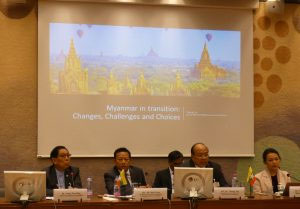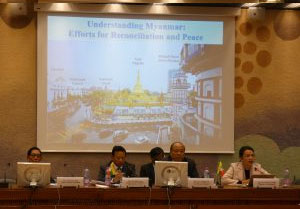

A side event entitled “Understanding Myanmar: Efforts for Reconciliation and Peace” was organized by Myanmar on 8th March 2018 on the sidelines of the 37th Session of Human Rights Council being held at the United Nations Office in Geneva from 26th February to 23rd March 2018. The Myanmar delegation led by U Thaung Tun, Union Minister for the Office of the Union Government, made a briefing at the side event.
The Myanmar delegation also includes Dr. Aung Tun Thet, Chief Coordinator of UEHRD, Daw Pyone Kathy Naing, Member of Pyithu Hluttaw, U Je Yaw Wu, Member of Amyotha Hluttaw, U Nay Oke Tint and Daw Haymar Min Thu.
More than 40 Permanent Representatives/ Representatives from Permanent Missions and UN agencies in Geneva were present at the event. U Htin Lynn, Permanent Representative of Myanmar made the introductory remarks.
The Union Minister briefed the event on changes, challenges and choices of Myanmar. Salient points of his statement are as follows; —
- Myanmar too has undergone remarkable change and transformation in recent years. The country has abandoned 5 decades of military rule and is striving to ensure that democracy takes firm root. We are now on a path of transition away from centuries-long legacies of colonial occupation, ethnic rivalries and military rule.
- Immediately after taking office, the government began revitalizing the peace process. In spite of the complexities involved, there have been significant progress. The Nationwide Ceasefire Agreement (NCA) was signed by 8 ethnic armed groups in 2015. A new milestone in the direction of peace was made last month when 2 more ethnic armed groups came on board.
- With regard to rule of law, it is worth mentioning here that yesterday, State Counsellor Daw Aung San Suu Kyi, in addressing the conference on justice and rule of law underscored the need for judicial and legal reforms.
- The complexity is compounded by the high expectations of the new government by the international community and our own people.
- With regard to Rakhine, it is only natural that there can be critics and doubting Thomases. Skepticism may well be warranted. However, what we need is constructive criticism and not recrimination and the passing of judgment. We need to find a constructive way forward.
- Nothing must be done to derail the transition to democracy.
- In Rakhine, our efforts to bring peace and development was on track till August 2017 when violence was triggered by the attacks on security forces by terrorists. Regrettably, the attacks and the subsequent mass displacement of people changed the situation and negatively affected the perception and attitude of the international community on the situation in Myanmar.
- The Government, recognizing the urgent need to find a lasting solution to the problem of Rakhine, has been working to promote peace, harmony, and development for all communities.
- The Government has initiated a number of programmes to find a sustainable solution to the issue of Rakhine. We are currently implementing the recommendations of the Annan Commission. A Ministerial level implementation committee and an Advisory Board, made up of eminent personalities from home and abroad, has been set up to help us find lasting solution. The State Counsellor herself is leading a public-private enterprise, the Union Enterprise for Humanitarian Assistance, Resettlement and Development in Rakhine (UEHRD), to provide humanitarian assistance, carry out resettlement and rehabilitation and to develop Rakhine State.
- Allegations of widespread “atrocities”, “ethnic cleansing” and “genocide” have been made repeatedly. The government and the leadership have been accused of standing by in silence.
- The leaders of Myanmar, who have been struggling so long for freedom and human rights, will never condone any action that can be construed as ethnic cleansing or genocide. The government will do everything to prevent it.
- We take the allegations of human rights violations seriously and will take action against offenders whenever there is clear evidence.
- Far from being indifferent to the situation, we care deeply for all people affected, including those who have fled to Bangladesh, due to recent incidents in Rakhine.
- Following the agreement reached between Myanmar and Bangladesh, we have made preparations for the repatriation of the displaced persons.
- Concerns have been expressed by the international community for the safety and security of the returnees. We have strengthened our border guard police capacity to ensure the safety of the returnees as well as all communities – Rakhine, Muslim, Daingnet, Mro, Thet, Maramagyi and Hindu. They are all victims of violence and terrorism. Security needs to be ensured for all.
- Today, we are faced with terrorism, funded and inspired from abroad. This is a dangerous trend for all of us. We need to join hands to counter the growing threat posed to our region by terrorism.
- The complexities and challenges in Rakhine cannot be seen in isolation and through a narrow lens of human rights of one particular community alone.
- On our part, Myanmar is ready to continue to work with the international community.
- At the same time, we earnestly hope that the international community will pursue a more objective and balanced approach to help overcome the challenges in Rakhine.
- Without mutual understanding, mutual suspicion and hostility will prevail. The lives of those most affected will not improve. And the door will be open to even greater tragedy.
- I believe that the better choice before us is to recognize the reality, the situation obtaining on the ground and accommodate each other’s concerns. We must work together to build trust and confidence in order to achieve lasting peace, stability and development in Rakhine.
Then, Dr. Aung Tun Thet, Chief Coordinator of Union Enterprise for Humanitarian Assistance, Resettlement and Development in Rakhine State (UEHRD), appraised the event of the Myanmar’s development strategies and agendas, which are in line with Sustainable Development Goals. He also briefed the work of public-private enterprise, UEHRD, in term of humanitarian assistance, resettlement and development in Rakhine State through ten task forces.
Daw Pyone Kathy Naing, Member of Pyithu Hluttaw, based on her thirty- year experience on human rights, explained her perspectives on Rakhine, among others, providing humanitarian assistance in Rakhine, promotion and protection of human rights, concerns of the terrorist act of ARSA. She stressed that no one is above the law and they will continue to fight for it. She urged the international community to extend understanding and cooperation to Myanmar. She warned that sanctions against Myanmar will affect most on the ordinary people of Myanmar.
During the questions and answers session, Permanent Representatives/ Representatives of Japan, Thailand, the Philippines, European Union and Australia raised the questions related to state of cooperation between Myanmar and UNDP and UNHCR on humanitarian and development assistance in Rakhine State, the work and funding of UEHRD, cooperation with the World Bank, more access for humanitarian organizations, the repatriation process, possibility of setting up a national independent investigation commission, actions against security persons who committed human rights violations, freedom of movement and prevention of statelessness.
The Union Minister and the Chief Coordinator responded the questions.
After the side event, the Union Minister briefed the press on the situation in Rakhine State at the United Nations Office and held telephone interview with BBC (Myanmar).
Useful Websites
Government Websites
UNITED NATIONS WEBSITES
- http://www.un.org
- https://unog.ch/
Quick Links
- President Office
- State Counsellor Office
- Ministry of foreign Affairs
- Ministry of Immigration and Population
- Ministry of Hotels and Tourism
UMFCCI - Travel Information
